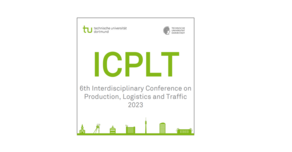TRR 391 – Spatio-temporal Statistics for the Transition of Energy and Transport
- Projects
- Current Projects
- Simulation and Logistics Engineering
Background
Global trade and e-commerce have led to an increase in commercial transport worldwide. More and more logistical hubs are being built, which require quick, informed logistical decisions. Reducing greenhouse gas emissions and increasing energy efficiency are of growing importance in the transport sector. Logistics as a discipline for designing and managing spatio-temporal configurations of production and distribution systems requires researchers and practitioners to better understand and operate transport logistics facilities. Our project aims to enhance the decision-making and design processes for transport logistics systems by using simulation studies, developing appropriate surrogate models, sensitivity analysis methods, and global optimization algorithms.
Procedure
To reach this goal, the project addresses systems like container, parcel sorting, and less-than-truckload terminals, which are modeled by discrete-event simulation. Additionally, different classes of newly designed meta-models will be developed and compared. One source of uncertainty are data sets for system loads and process settings that are essential for simulation experiments of transport logistic systems. The uncertainty in logistic key performance indicators due to uncertainties in system load, process, and decision variables will be assessed by global sensitivity analysis. Also, methods and results of sensitivity analysis and global optimization of key performance indicators for logistical decision-making are provided.
Aimed Results
The primary objective is to support decision-making related to scheduling, resource allocation, and inbound and outbound relations, and to analyze the effects of various decision scenarios and system process configurations. We provide methods to build and use meta-models based on simulations of logistic terminals to offer high-quality support for resource-efficient decisions.
Contact: Prof. Dr.-Ing. Uwe Clausen; Maximilian Mowe
Funding and partners






